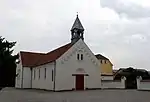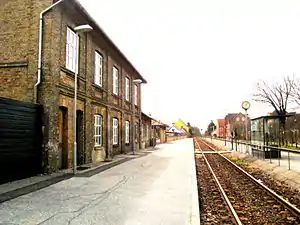Vrå
Vrå is a railway town in Hjørring municipality, Denmark. It was the former municipal seat of the abolished Løkken-Vrå municipality. Vrå has a population of 2,474 (1 January 2020).[1]
Vrå | |
|---|---|
Town | |
 Town center | |
| Country | Denmark |
| Region | North Jutland Region |
| Municipality | Hjørring Municipality |
| Area | |
| • Total | 929.58 km2 (358.91 sq mi) |
| Population (2020) | |
| • Total | 2,474 |
| Time zone | UTC+1 |
Vrå is served by Vrå railway station, located on the Vendsyssel railway line between Aalborg and Frederikshavn.
History
In 1370, the town’s name was documented as Wra, with later iterations of Vraa, Wraa, and Vro. In Danish, "Vrå" means nook or corner.[2] Despite its long history, Vrå was only a small farming community until the late 19th century, when a station was constructed on the Vendsyssel railway line. The station building was erected in 1870 and the railway opened in 1871. The town largely grew up around the railroad, and most buildings were constructed after its completion. The town’s population grew rapidly following the construction of the railroad; in 1850 the population had been 691, and by 1901 had grown to 1,594.[3] The city is divided by the railway, the majority of the town’s commercial buildings are on the east side.[4]
The town is home to Vrå Højskole, a folk high school. It was originally founded in 1872 in the small town of Stenum, 7 kilometers southwest of Vrå. As the school grew, proposals were made to move it closer to the central railway in the region. In 1890, it officially relocated to Vrå. The school originally taught language, mathematics, and agricultural courses, catering to the local agricultural community. Since the mid 1900s, it has focused on the creative arts.[5][6] The school collaborates with Kunstbygningen, an exhibit for art. Its exhibitions began in 1942, then primarily showing works donated by its founder, Svend Engelund.[7]
Religion
Vrå church (Danish: Vrå Kirke) is located 9 kilometers north of Brønderslev. It operates as a parish church within the Diocese of Aalborg of the Church of Denmark. The nave was originally constructed from the late 12th to early 13th century in the romanesque style.[8] Other later additions, including the tower, of the church are gothic.[9] The interior of the church has a preserved fresco from ca. 1510–1525.[10]
Vrå Congregational Church (Danish: Vrå Valgmenighedskirke) was founded in 1900. The church was established following an incident which saw the rejection of a priest's application to lead the parish, despite support from the community. Today the congregation has approximately 350 members. The church follows Grundtvigian theology, and is affiliated with the Church of Denmark.[11]
There is also a baptist church and an Inner Mission in Vrå.
 Vrå Church (Vrå Kirke)
Vrå Church (Vrå Kirke) Fresco at Vrå Church
Fresco at Vrå Church Vrå Congregational Church (Vrå Valgmenighedskirken)
Vrå Congregational Church (Vrå Valgmenighedskirken)
References
- BY3: Population 1st January, by urban areas The Mobile Statbank from Statistics Denmark
- Christiansen, Eigil; Eggert, Birgit (1 September 2016). "Vrå". lex.dk (in Danish). Trap Danmark. Retrieved 5 January 2021.
- Lindhardt, Charlotte; Tovgaard-Olsen, Katrine (1 September 2016). "Vrås historie". Trap Danmark (in Danish). Retrieved 5 January 2021.
- "Vrå historie". Vrå Lokalhistoriske Arkiv (in Danish). Retrieved 5 January 2021.
- "Højskolens historie". Vrå Højskole (in Danish). Retrieved 5 January 2021.
- Christensen, Frederik (2008). "Vrå Højskole". www.hojskolehistorie.dk (in Danish). Retrieved 5 January 2021.
- "Kunstbygningen i Vrå". kunsten.nu (in Danish). Retrieved 5 January 2021.
- "Vrå Kirke". Vrå og Em kirker (in Danish). Retrieved 5 January 2021.
- Christiansen, Jørgen Hegner (1 September 2016). "Vrås arkitektur". Trap Danmark (in Danish). Retrieved 5 January 2021.
- Gøssing, Preben (6 June 2017). "Vrå Kirke". Den Store Danske (in Danish). Retrieved 5 January 2021.
- "Baggrundshistorien". www.vraavalgmenighed.dk (in Danish). Retrieved 5 January 2021.
